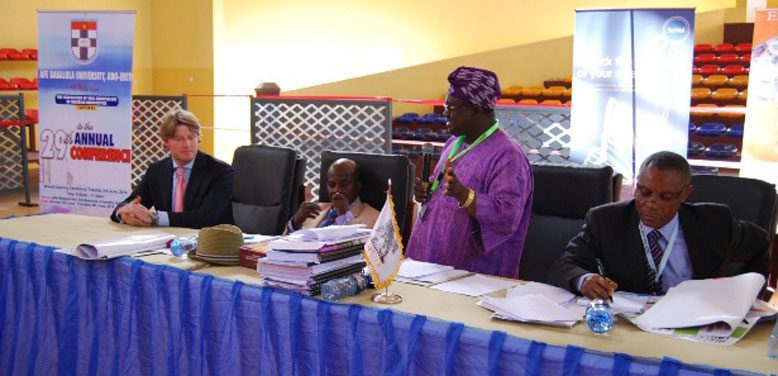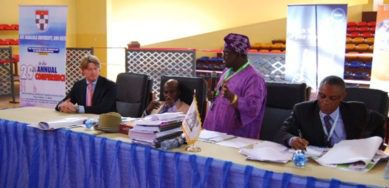Democracy & Governance
Beyond 2015: Rebuilding our battered institutions -By Ayo Olukotun

Two short takes and we are on to the main comment. It must be taking all of President Goodluck Jonathan’s wits to walk the unenviable tightrope dictated by his somewhat contradictory roles as Head of State, in which capacity he is a revered symbol of the Nigerian people in their entirety, and expected to stand above the fray; and his role as a presidential aspirant on the platform of the Peoples Democratic Party. Admittedly, even in advanced democracies with established state structures, presidents sometimes falter, without skidding off the tightrope. In the last fortnight, however, as indiscretion after indiscretion by the police under its controversial helmsman Suleiman Abba as well as other security institutions piled up, Jonathan, not by what he has done but by what he has not done stands in danger of missing the precarious balance between the politician and the guardian of the Nigerian State.
Let me explain. When, a fortnight ago, I called up a friend, an academic from Northern Nigeria and with pronounced sympathies for the Jonathan administration to discuss the raid by the Department of State Service on one of the offices of the All Progressives Congress, he, not having previously heard the report shot back: “The story is either a ruse or it is the work of fifth columnists trying to discredit Jonathan”. Well, it turned out to be neither, but rather a carefully planned event explained as an effort to disrupt suspected cloning of permanent voter cards by the APC operatives who allegedly were also trying to hack into the Independent National Electoral Commission computers. To be sure, these are serious allegations; but as of the time of writing, the nation is still waiting for the evidence presumably gathered in the course of the raid which justified such a high-handed deployment of state power.
Add to this the withdrawal of security personnel attached to the Speaker of the House of Representatives, Aminu Tambuwal, following his switching from the PDP to the APC and the forcible prevention of members of the House of Representatives including the Speaker from entering the Assembly complex and you will gain an insight into the current threat to impeach Jonathan. True, as government spokesmen insist, Jonathan did not order these controversial actions but couldn’t he have clearly distanced himself from them in his capacity as the President of all the people?
Tit bit two: It is mysterious that a former president, Olusegun Obasanjo, has lately unleashed a barrage of attacks on his former protégé whom he helped to make president, Jonathan. Obasanjo insists, that he is still a member of the PDP while in the same breath consistently puts Jonathan on the spot. As far as this writer is aware, the convention in most democracies is that former presidents do not criticise sitting presidents since they are expected to have access to them in order to give advice. Also, it seems a bit awkward for a former president to engage in what we may call “my-performance-is-better-than-yours” competition with his successor. Well, the jury is still very much out on what exactly the motives of Obasanjo are for descending into the political fray in the manner he has done. Now, to the main comment.
Irrespective of who becomes Nigeria’s president in 2015, the dishevelled state of our institutions would remain a matter for concern. Interestingly, a high level panel of eminent persons on post-2015 development agenda appointed by the United Nations Secretary General has recently emphasised the need for a “fundamental shift to recognise the significant role of institutions in contributing to the citizens’ well-being”. Obviously, weak, unaccountable and ineffective institutions cannot deliver services to the citizenry no matter how well intentioned politicians and policymakers are.
To be sure, institutions globally are at a low ebb. A few months ago, influential American scholar, Francis Fukuyama, published the second volume of his magnificent book entitled, “Political Order and Political Decay: From Industrial Revolution to Globalisation of Democracy’. Fukuyama has very harsh words for American political institutions, which he argues, have been “re-patrimonialised”. He went on to say that the major political institutions in America are “increasingly dysfunctional and the effectiveness of federal agencies in performing critical functions is in a long-term decline”. Although debatable, Fukuyama’s view is a restatement of Harvard historian, Neil Ferguson’s claim in a book published last year that, “the great recession is merely a symptom of great de-generation” affecting western democracies. In other words, the recession of the emancipatory potential of institutions is a global trend.
Institutional decay, obviously, is a matter of degree and context. In Nigeria, what we are witnessing is the descent into virtual paralysis or capture by predatory interest groups of institutions. The approach of successive governments to the problem has been to change personnel at the top in the hope that this will bring a turnaround in performance. Needless to say that this stratagem has not worked as the rot goes deeper than personnel changes can address. If for example Suleiman Abba is removed as the Inspector-General of Police, it may lower the political temperature; it would however hardly address the broken down status of the police as a security institution. As the increasing resort of citizens to privately funded security outfits demonstrates, years of underperformance on the part of the police have eroded trust in their ability to deliver security. Only last week, in broad daylight, the co-coordinator, Anyiam Osigwe Foundation, Michael Anyiam Osigwe, was assassinated by gunmen on the Ore-Benin Road. Persistent underfunding, low morale, and under-equipping have hollowed out that institution.
Similarly, the recent face-off between the Global Alliance for Vaccine and Immunisation and our Ministry of Health over the alleged diversion of funds meant to procure vaccines is a parable of the soft underbelly of many of our institutions. In this particular case, it is interesting that it took an audit by a global organisation to uncover systemic lapses in a key health institution. It is on record, in this connection, that many government departments carry on for many years without having their accounts audited.
What then can be done to rebuild our prostrate institutions? One option is to revive the research infrastructure in order to provide a clear mapping of our institutions. A decade or so ago, it was fairly common to see researchers administering questionnaires with a view to measuring things like job satisfaction, workers’ morale and features of organisational behaviour. Today, even the most elementary data about the size of the workforce in our institutions are not available. Evidence-based monitoring of the performance of our institutions constitutes one way therefore of redeeming them. There is also the need to introduce performance contracts as well as enforce them. Contracts that are not enforced are a dead letter and it is a matter for regret that the performance contracts about which much were made last year has remained a slogan because it lacks the force of implementation. In sum, to rebuild our institutions, we need both a reform agenda as well as reformers who will implement the agenda.
Finally, it is important that the civil society organisations maintain oversight on the health of our public institutions using the leeway provided by the Freedom of Information Act.


















